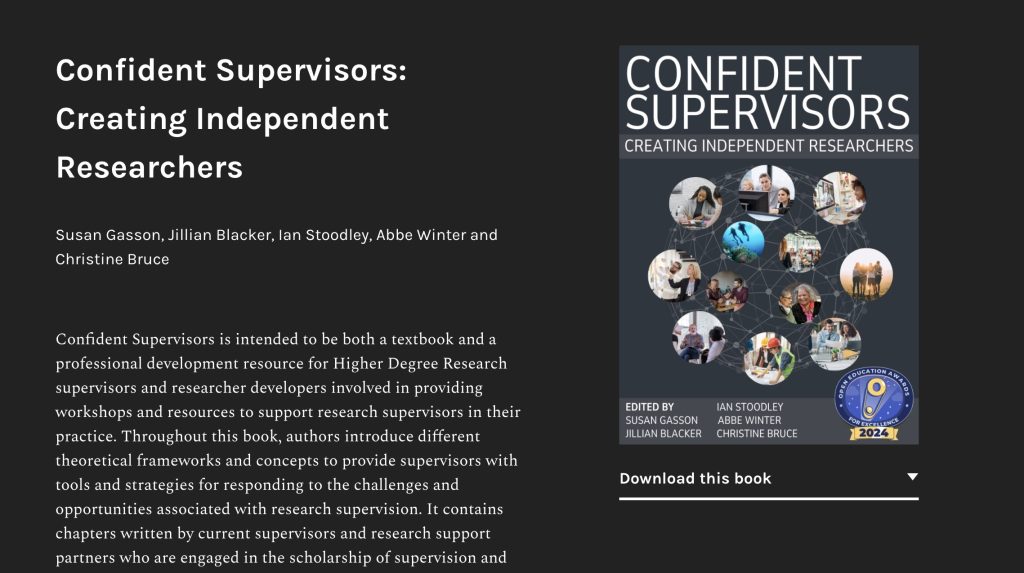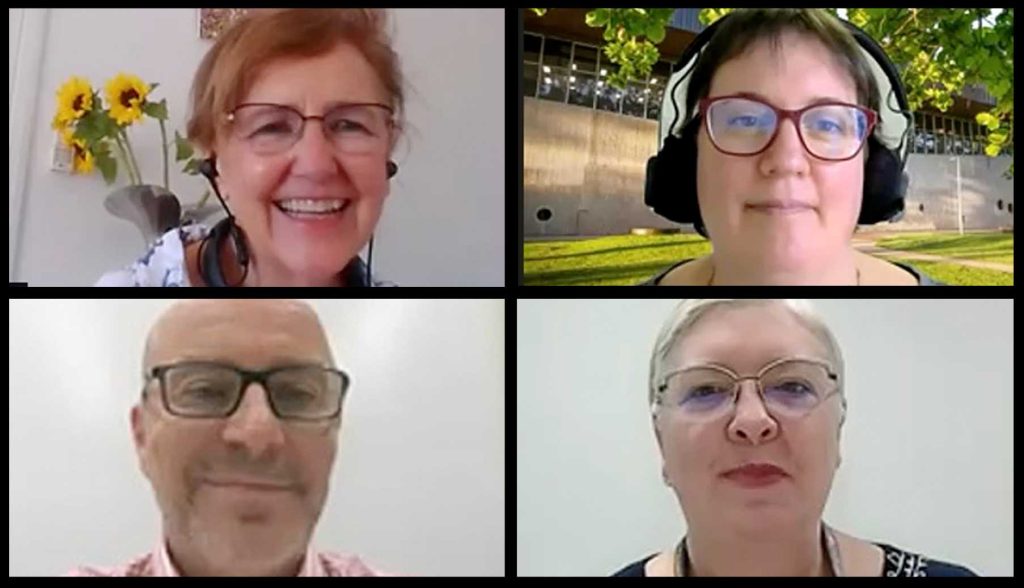This article was written by Maritez Apigo, Open Educational Resources (OER) Coordinator, Distance Education Coordinator, and English Professor at Contra Costa College.

At the start of 2024, the Open for Antiracism (OFAR) program welcomed a new Program Director, Laura Dunn. Laura is replacing Una Daly, who began her well-deserved retirement –or what she refers to as “rewirement” — in December 2023 from her service as the OFAR Co-Director since the beginning in 2020. Laura co-leads OFAR alongside James Glapa-Grossklag, Dean of Educational Technology, Learning Resources, and Distance Learning at the College of the Canyons. I had the honor of interviewing Laura, and I became instantly intrigued by her Hawaiian indigeneity, her experience serving as a Director and an Editor-in-Chief, and her research on South Asian and Pacific spiritual and religious traditions.
Please tell us about your background and experience.
For the past five years, I’ve worked in various roles at Santa Clara University’s Berkeley campus, the Jesuit School of Theology, as director of assessment, the writing program, and masters program. Before that, I was the assistant director for a K-12 learning center in Honolulu, Hawai’i that offered tutoring and student support. For the last six years I’ve been a faculty member at the GTU’s Center for Dharma Studies in Berkeley, where I teach graduate courses on yoga philosophy, history, and Hinduism. I’ve also taught introductory religion courses at Windward Community College in Kane’ohe, Hawai’i.
I’m one of the editors in chief of the Journal of Dharma Studies: Asian and Transcultural Religion, Philosophy, & Ethics, a peer-reviewed journal that focuses on the intersubjective understanding and real-world applications of Hindu, Jain, and Buddhist traditions, contextualizing them in reference to the contemporary global era.
This year completes my involvement in a two-year-long shared sacred story project with the Fetzer Institute, which brought together some of the most illustrious scholar-practitioners of the world’s religious traditions to develop a shared story that honors “religious, spiritual, and scientific diversity while connecting us across these differences in love.”
These roles have been deeply informed by my ongoing research and study of South Asian and Pacific spiritual and religious traditions, history, and culture. I’m very interested in issues around translation, knowledge, power, race, and colonialism, as well as the potential for intercultural, interracial, and interreligious dialogue and empathy.
I have always felt I have two sides to myself—the analyst concerned with organizations and systems and the creative visionary interested in abstraction, innovation, and possibilities. I hope these two halves can come together to support OFAR’s continued success, evolution, and potential to transform higher education.
What do you enjoy doing in your free time?
I don’t have much free time, but I love fitness, yoga, meditation, hanging out with animals, nature, writing, and photography.
How does your indigenous background connect to your interest in OFAR?
I come from a family of educators who were and are committed to educational equity across differences. As a Native Hawaiian brought up by educators, I’ve had both privileges and challenges in navigating an educational system that does not work in service of the majority of Native Hawaiians. Hawaiian culture’s concept of “knowledge” (‘ike) has never been tied to book learning or quantitative reasoning. Rather, we have come to know our place in the world through knowledge of our kuleana—the unique gifts and talents that we are privileged to share with others in service of our lāhui (community).
It’s no surprise that many indigenous people distrust and feel excluded from Western educational institutions that have historically been used as tools for oppression and control. Yet, despite its inherent problems, higher education remains the primary gateway through which marginalized folx can start instigating social change. Notwithstanding, the barriers to higher education for indigenous people are formidable. Native Hawaiians and Pacific islanders are among the least likely to attend college and even less likely to graduate. This means lower representation in higher education, government, schools, the arts, etc. Without representation, transformation is not possible. As we know, though specific marginalized groups face their own problems and have their own histories, we come together in solidarity against common systems and structures of oppression.
OFAR is important because it’s one of the few antiracism educational initiatives that begins where the work is most important and impactful—at community colleges where education is still viewed as a collective right, rather than a privilege. The OFAR program provides educators with the tools and support to uplift long-silenced voices that must become a part of our cultural discourse if we are to achieve collective, lasting liberation.
What is your experience with antiracism? How does it connect to OFAR?
My work in antiracism started during my doctoral research when I explored the intersections between race, politics, ideology, and Western adoption and appropriation of spiritual and religious practices such as yoga and meditation. One of the dimensions I explored was how culture and tradition are translated into new cultural contexts and the power dynamics that undergird their transmission. Conversely, I sought to understand how authentic immersive encounters with ideological, cultural, and racial “others” can become catalysts for genuine empathy. Much of what I witnessed and experienced while traveling amongst (mostly) white, affluent Western spiritual seekers on pilgrimages to places like India and Hawai’i was the importance of humility, submitting oneself to the unknown, and developing the capacity for deep listening and seeing. My observation was that in the space between differences exists a generative void within which there is potential for renewal and revelation of self and other. While this work did not directly address antiracism, it is crucial to acknowledge that whiteness often pervaded many of the spaces and environments I occupied, while BIPOC individuals were frequently unintentionally excluded from engaging in regenerative practices like yoga and meditation. It was only when roles were reversed, and white individuals found themselves in unfamiliar territory, unable to navigate or communicate effectively, that genuine learning occurred. This experience underscored the transformative potential of decentralizing power dynamics, or at the very least, shifting them away from their traditional centers of authority.
In recent years, I’ve begun applying these ideas and research to understanding how Indigenous and South Asian pedagogies and epistemologies can function within contemplative and educational settings to promote holistic wellbeing while disrupting prevailing metanarratives that limit self-actualization and self-determination.
As the new Program Director, what is your vision for OFAR?
It’s a little early to speculate on what’s possible. Still, I would love to see OFAR develop an active publishing and expanded research agenda focused on the intersections between antiracism, open pedagogy, and open education in community colleges. Even in my first few months, the grassroots nature of the project, the primacy of student experiences, and the stories of our participants have opened a door of inquiry to the concept of antiracism through which we are invited to interrogate methods, pedagogies, ideas, and ways of understanding and furthering equity in schools. With a more robust publishing agenda, the questions and ideas generated by OFAR coaches and participants will undoubtedly influence developments beyond the CCC ecosystem.
Also, participants have commented that they’d like to develop communities of practice that can continue after they complete the OFAR program. I think this is a wonderful idea, and I like the idea of creating quarterly check-ins around particular themes or topics. This way, our faculty participants might have a guiding theme for their semester to discuss with others.
OFAR is so fortunate to have Laura’s expertise and fresh perspective. Her widespread contributions will help the program continue its mission to make significant curricular, pedagogical, and institutional transformations with open educational resources (OER) and open pedagogy aligned with antiracism and liberation for all students. In her words, “The OFAR program provides educators with the tools and support to uplift long-silenced voices that must become a part of our cultural discourse if we are to achieve collective, lasting liberation.”
Visit her website at www.lauramdunn.com.
Read more of Maritez’ articles on OFAR:
- “OFAR: A Faculty Perspective”
- “The Implementation of OFAR Antiracism Action Plans”
- “OFAR Year Three Kicks Off”
Open for Anti-Racism acknowledges the generous support of the William and Flora Hewlett Foundation in helping to make this program possible.

About Maritez Apigo
For two and a half decades, Maritez Apigo has had the honor of teaching English and ESL in community colleges, high schools, and middle schools in the Bay Area, California, and in Hawaii. She has been teaching online since earning her M.A. in English and TESOL from SFSU in 2012, and she holds an Online Network of Educators (@ONE) Certificate in Online Teaching and Design and an @ONE Advanced Certificate in Online Teaching Principles. Currently, she is the Distance Education Coordinator, the Open Educational Resources (OER) Coordinator, and an online and hybrid English Professor at Contra Costa College.
As a leader in online education, OER, and ZTC (Zero Textbook Cost), she trains and mentors faculty at the college, district, and state levels. She is an @ONE Online Course Facilitator of four professional development courses. On the leadership team of Open for Antiracism (OFAR), she serves as a Course Facilitator and the Lead Advisory Coach. For the California Community Colleges Chancellor’s Office ZTC Technical Assistance Program, she serves as a Curriculum Developer, Training Coordinator, and Course Facilitator. Her passions for social justice, equity, innovation, and student success are illuminated in her work.
When she’s not teaching, you might discover her behind the turntables DJing, in the dance studio working on her dance technique, or at a soccer field cheering on her two young children. Twitter: @maritezapigo


